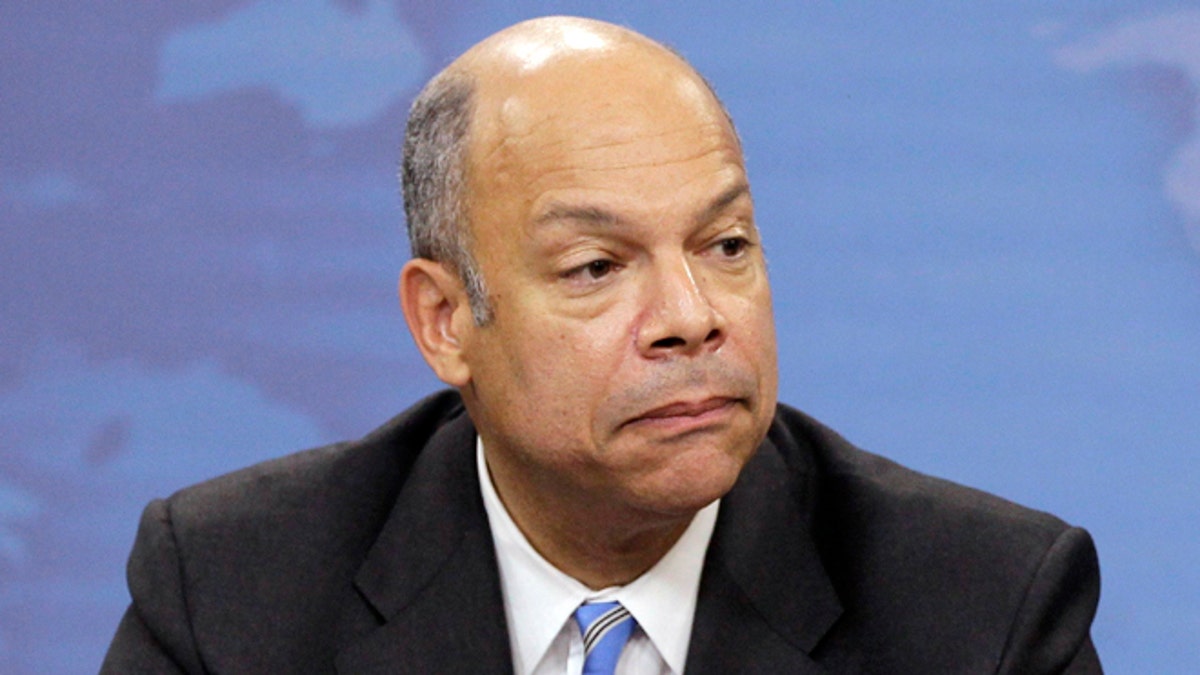
FILE: Nov. 30, 2010: Jeh Johnson speaks during a news conference at the Pentagon in Washington, D.C. (AP)
The Obama administration was accused Wednesday of providing cribbed answers to 23 questions in the form the Senate received for the hearing of its nominee to lead the Department of Homeland Security -- as the nominee also ran into criticism from one senator who said he won't vote for him unless he makes a major border security pledge.
Sen. John McCain, R-Ariz., got into a heated exchange with nominee Jeh Johnson, pressing him to commit to boost border security to 90 percent effectiveness. Johnson did not make the pledge. McCain said he, then, could not support his nomination.
That was after another senator, Tom Coburn of Oklahoma, charged that the White House "cut and pasted" Johnson's responses to the committee.
Coburn, the top Republican on the Senate Committee on Homeland Security and Governmental Affairs, charged at the start of Wednesday's hearing that some of the answers provided by Johnson are the same as those provided by previous nominees.
“These are the exact words [given] to the committee before,” he said. “We want to get your thoughts, not some legislative assistant's.”
Coburn said he supports Johnson’s nomination but will not allow it to go forward until the situation is corrected.
The White House could not be reached for comment. But Johnson did not deny the allegation.
And Delaware Sen. Tom Carper, the committee chairman, said he was “not surprised,” considering the questionnaire has about 100 questions.
He also told Johnson "to go back and edit” the answers.
In one example, Johnson’s questionnaire answer states that if confirmed he would: “continue to sustain common DHS intelligence standards as well as build privacy and civil rights protections into its operations, policies, programs and technology deployments from the outset of their development.”
In July 2011, then-Department of Homeland Security Secretary Janet Napolitano said the agency: “builds privacy and civil rights and civil liberties protections into its operations, policies, programs and technology deployments from the outset of their development.”
In another example, Johnson’s questionnaire states: “Critical infrastructure is the backbone of our country’s national and economic security. In addition to the federal buildings where millions of Americans work and visit each day, it includes power plants, chemical facilities, communications networks, bridges, highways, and stadiums.
Napolitano submitted written Hill testimony in March 2013 that in part stated: “Critical infrastructure is the backbone of our country’s national and economic security. It includes power plants, chemical facilities, communications networks, bridges, highways, and stadiums, as well as the federal buildings where millions of Americans work and visit each day.”
The long-time Obama supporter and former Defense Department general counsel would be the fourth Homeland Security secretary, if confirmed.
Johnson, a multimillionaire attorney who was largely unknown in homeland security circles, was greeted in the hearing room by a small group of protesters decrying his role as a former top Defense Department lawyer who authorized drone strikes abroad. Capitol Police officers quickly moved the protesters to the back of the crowded room as they chanted "no drone lawyer for DHS" and carried pink signs.
Johnson was nominated by Obama, and some have questioned whether he has the necessary law enforcement and management experience to run the more than 200,000-employee agency.
In his opening statement, Johnson addressed those concerns immediately.
"I have experience in law enforcement," he said, citing his two years of experience as a federal prosecutor in New York. "I worked with law enforcement officers of the Secret Service, what was then called the Immigration and Naturalization Service, the FBI, the DEA and other federal, state and local law enforcement agencies."
Fox News' Catherine Herridge, Chad Pergram and Joseph Weber contributed to this report, which is also based on wire service reports.




